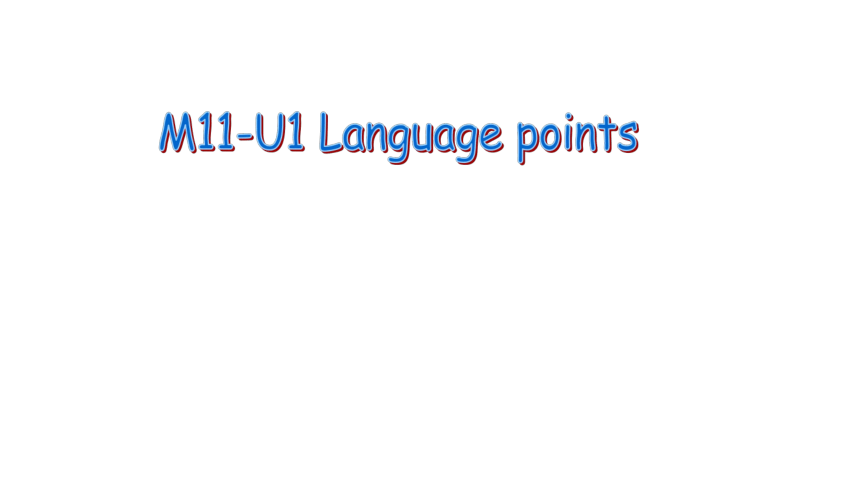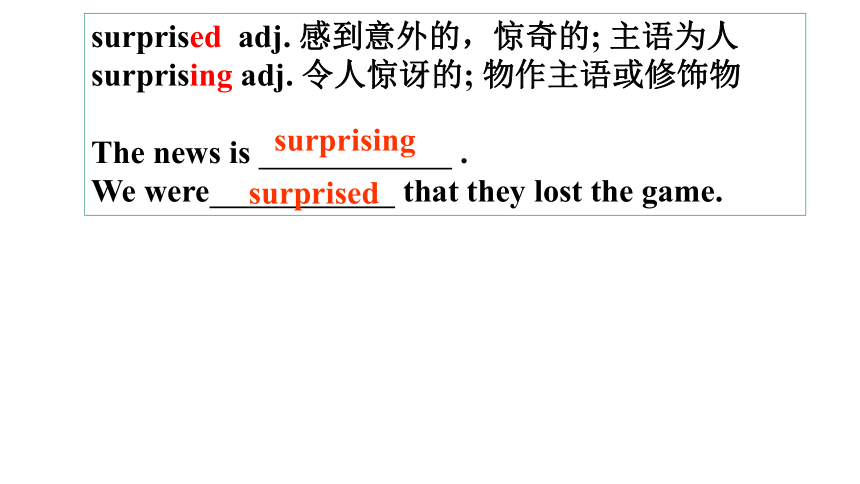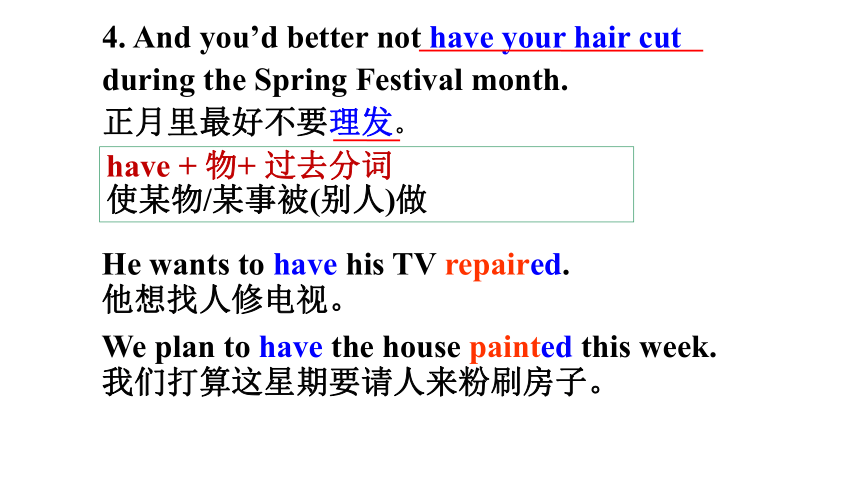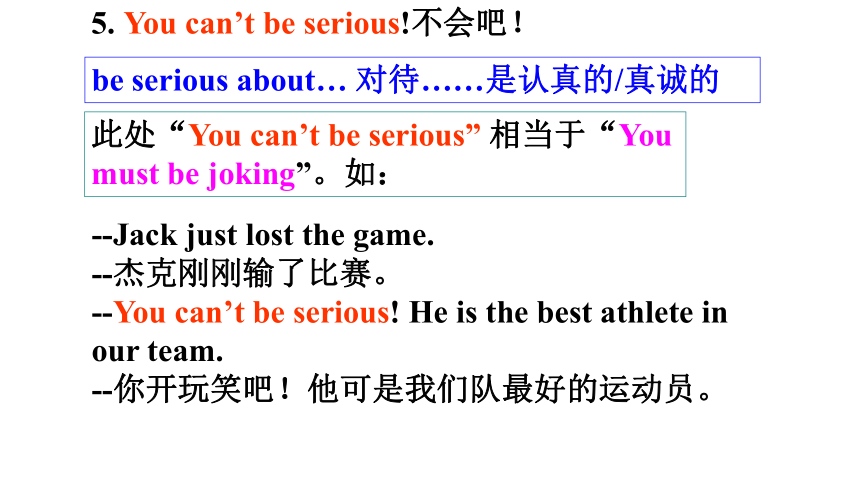Module 11 Way of life Unit 1 In China ,we open a gift later知识点课件(共15张PPT)
文档属性
| 名称 | Module 11 Way of life Unit 1 In China ,we open a gift later知识点课件(共15张PPT) |  | |
| 格式 | zip | ||
| 文件大小 | 72.5KB | ||
| 资源类型 | 试卷 | ||
| 版本资源 | 外研版 | ||
| 科目 | 英语 | ||
| 更新时间 | 2021-10-16 14:04:33 | ||
图片预览







文档简介
(共15张PPT)
M11-U1 Language points
1. What a surprise! 这真是个惊喜!
To my surprise, he walked out without
saying a word.
John turned around and looked at me in surprise.
surprise 作名词,意为“惊奇”,常用短语:
to one’s surprise 令某人吃惊的是
in surprise 惊奇地,吃惊地
surprised adj. 感到意外的,惊奇的; 主语为人
surprising adj. 令人惊讶的; 物作主语或修饰物
The news is .
We were that they lost the game.
surprising
surprised
2. But back in the US, we open a gift immediately.
但是在美国,我们会马上打开收到的礼物。
immediately 作副词,意为“立刻,当即”。
at once; right now, in no time 也表示立即、当即
Be quick! The match will begin immediately.
快点,比赛马上就开始了。
We should leave immediately.
我们应该立刻离开。
3. But in the West, we usually don’t pay much attention to that.
但是在西方,我们往往不会刻意这么做。
You should pay attention to looking after yourself.
你应该注意照顾自己。
Well, pay more attention to it next time.
下次要多注意些。
pay attention to 意为“注意;留心”,
to后接名词、代词或V-ing形式。
4. And you’d better not have your hair cut during the Spring Festival month.
正月里最好不要理发。
have + 物+ 过去分词
使某物/某事被(别人)做
He wants to have his TV repaired.
他想找人修电视。
We plan to have the house painted this week.
我们打算这星期要请人来粉刷房子。
5. You can’t be serious!不会吧!
此处“You can’t be serious” 相当于“You must be joking”。如:
--Jack just lost the game.
--杰克刚刚输了比赛。
--You can’t be serious! He is the best athlete in our team.
--你开玩笑吧!他可是我们队最好的运动员。
be serious about… 对待……是认真的/真诚的
6. They taste great. (饺子)很好吃。
taste为系动词,意为“尝起来”,后接形容词作表语。类似用法的还有:look, feel, smell, sound等。如:
The dumplings your mum made taste very delicious.
你妈妈做的饺子真好吃。
You look very tired.
你看起来很疲惫。
7. accept 接受; 表示主观感受, 指经过考虑愿意接受
receive 收到;只表示客观上收到, 不涉及本人是否愿意接受
She received his present, but she won’t accept it.
8. difference n. 差别;差异
different adj. 不同的
… be different from… 与……不同
… the same as … 和……相同
There are many differences between the two pictures.
Our car is different from yours.
9. I don’t think I should open it now. 否定前移
主句 从句
此句是含有宾语从句的复合句,当主句中谓语动词为 believe; think; suppose(应该) 时,主句的主语为第一人称且时态是一般现在时,从句否定词一般要前移到主语的谓语动词后。这种现象叫“否定前移”
We believe he tells lies.
We don’t believe he tells lies.
10. chess 国际象棋
play + 棋类运动 play chess
set (同类事物的)(一)套,(一)副,(一)组
I lost a set of keys.
11. Here’s your gift.
There/Here + 动词+ 名词.
There/Here + 代词+ 动词.
当here, there在句首且主语为名词时,主语和谓语要倒装;但主语是代词时,主语和谓语不用倒装。
Look! Here comes the bus!
Here we are at the hotel.
12. 感叹句
What+ (a/an)+ adj. + n. (主语+动词)!
How + adj./adv. +(主语+动词)!
an interesting book it is!
good teachers they are!
beautiful the flowers are!
hard they work!
What
What
How
How
13. for example 例如, 一般只以同类人或事物中的“一个”为例,可在句中作插入语,用逗号与前后隔开,也可置于句首或句末。
He, for example, is a good student.
For example, he is a good student.
such as 比如;例如 常用来列举同类人或事物中的几个例子,用在被列举的人或事物与前面的名词之间,后面不用逗号。
Some of the European languages came from Latin, such as French and Spanish.
M11-U1 Language points
1. What a surprise! 这真是个惊喜!
To my surprise, he walked out without
saying a word.
John turned around and looked at me in surprise.
surprise 作名词,意为“惊奇”,常用短语:
to one’s surprise 令某人吃惊的是
in surprise 惊奇地,吃惊地
surprised adj. 感到意外的,惊奇的; 主语为人
surprising adj. 令人惊讶的; 物作主语或修饰物
The news is .
We were that they lost the game.
surprising
surprised
2. But back in the US, we open a gift immediately.
但是在美国,我们会马上打开收到的礼物。
immediately 作副词,意为“立刻,当即”。
at once; right now, in no time 也表示立即、当即
Be quick! The match will begin immediately.
快点,比赛马上就开始了。
We should leave immediately.
我们应该立刻离开。
3. But in the West, we usually don’t pay much attention to that.
但是在西方,我们往往不会刻意这么做。
You should pay attention to looking after yourself.
你应该注意照顾自己。
Well, pay more attention to it next time.
下次要多注意些。
pay attention to 意为“注意;留心”,
to后接名词、代词或V-ing形式。
4. And you’d better not have your hair cut during the Spring Festival month.
正月里最好不要理发。
have + 物+ 过去分词
使某物/某事被(别人)做
He wants to have his TV repaired.
他想找人修电视。
We plan to have the house painted this week.
我们打算这星期要请人来粉刷房子。
5. You can’t be serious!不会吧!
此处“You can’t be serious” 相当于“You must be joking”。如:
--Jack just lost the game.
--杰克刚刚输了比赛。
--You can’t be serious! He is the best athlete in our team.
--你开玩笑吧!他可是我们队最好的运动员。
be serious about… 对待……是认真的/真诚的
6. They taste great. (饺子)很好吃。
taste为系动词,意为“尝起来”,后接形容词作表语。类似用法的还有:look, feel, smell, sound等。如:
The dumplings your mum made taste very delicious.
你妈妈做的饺子真好吃。
You look very tired.
你看起来很疲惫。
7. accept 接受; 表示主观感受, 指经过考虑愿意接受
receive 收到;只表示客观上收到, 不涉及本人是否愿意接受
She received his present, but she won’t accept it.
8. difference n. 差别;差异
different adj. 不同的
… be different from… 与……不同
… the same as … 和……相同
There are many differences between the two pictures.
Our car is different from yours.
9. I don’t think I should open it now. 否定前移
主句 从句
此句是含有宾语从句的复合句,当主句中谓语动词为 believe; think; suppose(应该) 时,主句的主语为第一人称且时态是一般现在时,从句否定词一般要前移到主语的谓语动词后。这种现象叫“否定前移”
We believe he tells lies.
We don’t believe he tells lies.
10. chess 国际象棋
play + 棋类运动 play chess
set (同类事物的)(一)套,(一)副,(一)组
I lost a set of keys.
11. Here’s your gift.
There/Here + 动词+ 名词.
There/Here + 代词+ 动词.
当here, there在句首且主语为名词时,主语和谓语要倒装;但主语是代词时,主语和谓语不用倒装。
Look! Here comes the bus!
Here we are at the hotel.
12. 感叹句
What+ (a/an)+ adj. + n. (主语+动词)!
How + adj./adv. +(主语+动词)!
an interesting book it is!
good teachers they are!
beautiful the flowers are!
hard they work!
What
What
How
How
13. for example 例如, 一般只以同类人或事物中的“一个”为例,可在句中作插入语,用逗号与前后隔开,也可置于句首或句末。
He, for example, is a good student.
For example, he is a good student.
such as 比如;例如 常用来列举同类人或事物中的几个例子,用在被列举的人或事物与前面的名词之间,后面不用逗号。
Some of the European languages came from Latin, such as French and Spanish.
同课章节目录
- Module 1 How to learn English
- Unit 1 Let's try to speak English as much as possi
- Unit 2 You should smile at her.
- Unit 3 Language in use .
- Module 2 My home town and my country
- Unit 1 It's taller than many other buildings.
- Unit 2 Cambridge is a beautiful city in the east o
- Unit 3 Language in use .
- Module 3 Sports.
- Unit 1 Nothing is more exciting than playing tenni
- Unit 2 This year we training more carefully.
- Unit 3 Language in use .
- Module 4 Planes, ships and trains .
- Unit 1 He lives the farthest from school.
- Unit 2 What is the best way to travel.
- Unit 3 Language in use .
- Module 5 Lao She Teahouse.
- Unit 1 I wanted to see the Beijing Opera.
- Unit 2 It descibes the changes in Chinese society.
- Unit 3 Language in use .
- Module 6 Animals in danger.
- Unit 1 It allows people to get closer to them .
- Unit 2 The WWF is working hard to save them all.
- Unit 3 Language in use .
- Revision module A
- Module 7 A famous story
- Unit 1 Alice was sitting with her sister by the ri
- Unit 2 She was thinking about her cat.
- Unit 3 Language in use .
- Module 8 Accidents
- Unit 1 While the car were changing to red, a car s
- Unit 2 I was trying to pick it up when it bite me
- Unit 3 Language in use .
- Module 9 Population
- Unit 1 The population of China is about 1.37 billi
- Unit 2 Arnwick was a city with 200,000 people.
- Unit 3 Language in use .
- Module 10 The weathe
- Unit 1 It might snow.
- Unit 2 The weather is fine all year round.
- Unit 3 Language in use .
- Module 11 Way of life
- Unit 1 In China ,we open a gift later.
- Unit 2 In England, you usually drink tea with milk
- Unit 3 Language in use .
- Module 12 Help
- Unit 1 What should we do before help arrives?
- Unit 2 Stay away from windows and heavy furniture.
- Unit 3 Language in use .
- Revision module B
